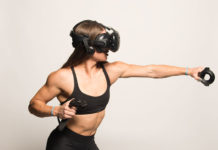VR games and social media continue to intertwine with reality. Studies have shown that when a person has a strong identification with his or her cyber representation, the “doppelganger” can influence the person’s real life behavior. The reality of using VR weight loss methods might just be the answer millions have been looking for.
Now, researchers believe virtual reality experiences could have a positive impact on weight loss and other health improvements. According to one recent study from the University of Missouri – Columbia, individuals who strongly identified with their VR representation of themselves (avatar) experienced behavioral changes based on the actions of the avatar. Researchers believe that harnessing this power could help in the treatment of obesity, and positively affect people’s racial and gender-related prejudices.
According to Elizabeth Behm-Morawitz, assistant professor of communication in the College of Arts and Science, “The creation of an avatar allows an individual to try on a new appearance and persona, with little risk or effort. That alter-ego can then have a positive influence on a person’s life. For example, people seeking to lose weight could create fitter avatars to help visualize themselves as slimmer and healthier.”
Second Life Study Shows Avatars Have Positive Influence on Real Life Behavior
Behm-Morawitz’s study, entitled “Mirrored selves: The influence of self-presence in a virtual world on health, appearance and well-being,” was published in the journal Computers in Human Behavior and included 278 Second Life VR community users. The users were asked questions about their engagement with their avatar and the relationships they’d developed online. They were also asked about their real-life appearance, their emotional well-being, and their health.

Researchers found “self-presence,” or the degree to which users experienced an avatar as an extension of their real-life self, predicted the influence that avatar had on a person’s reality. Those with a strong sense of self-presence in the VR world tended to be positively affected in the areas of health and well-being, and they reported their experience improved how they felt about themselves offline. The study also showed a link between self-presence and greater satisfaction with online relationships.
According to Behm-Morowitz, “This study found no evidence of negative effects of a high degree of self-presence in the virtual world on study participants; however, that doesn’t rule out the possibility. Users should practice moderation. Virtual entertainment, like other forms of diversion such as books or television, can be used in unhealthy ways.”
VR Experiences Could Improve Tolerance of Human Differences
Behm-Morowitz already has plans for delving further into virtual worlds and plans to examine how avatars could be used to improve tolerance of diversity concerning gender, race, and ethnicity. She speculates that by creating avatars that are different races or genders, people could experience prejudice and discrimination, making it easier to empathize with these scenarios in the real world and decreasing a person’s own prejudice.

According to Behm-Morowitz, “This may occur through the process of identification with an avatar that is different from oneself, or through a virtual simulation that allows individuals to experience discrimination as a member of a non-dominant group might experience it.”











